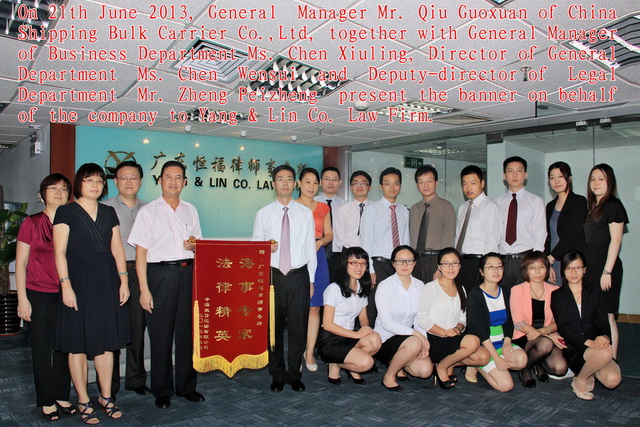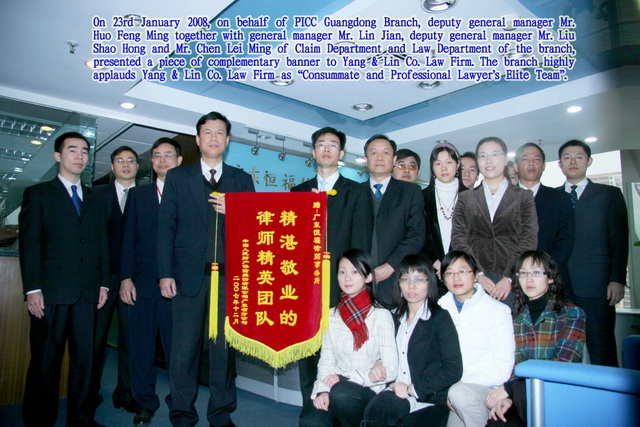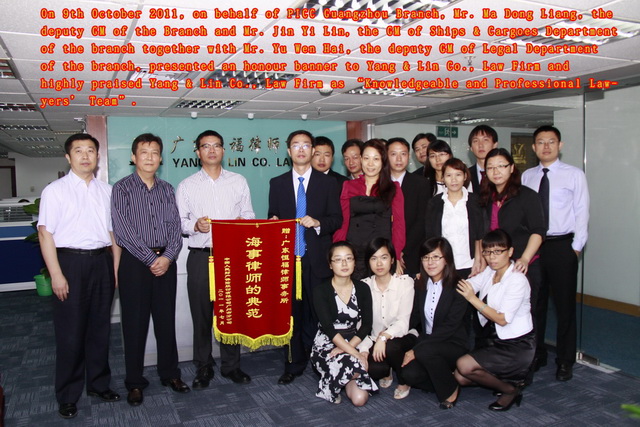In order to enact the Provisions of the Supreme People's Court on Several Issues concerning the Application of Law in the Arrest and Auction of Ships (hereinafter referred to as Judicial Interpretation about Vessel Arrest and Auction), the Supreme Court held the conversazione of Judicial Interpretation about Vessel Arrest and Auction in Guangzhou Maritime Court from 28 to 29 March 2013. Personnel attended the conversazione included Deputy Director Wang Yanjun, presiding judge Wang Shumei and the Judge Huang Xiwu from the 4th civil Division of the Supreme Court, Deputy Director Wang Jianping and Judge Mofei from the 4th civil Division of Guangdong High Court, vice president Zhan Siminm, vice president Huang Weiqing and vice president Chen Bin and some directors from the Guangzhou Maritime Court as well as 20 other experts from maritime safety administrations, colleges and universities, shipping companies, insurance companies and law firms. Mr. Yang Yunfu from our law firm was invited to the conversazione.
On the conversazione, Mr. Yang brought forward many suggestions and advices for revision to the Judicial Interpretation about Vessel Arrest and Auction (exposure draft), most of them received full affirmation and approval from the Supreme Court and attending experts.
Suggestions and advices brought up by Mr. Yang were mainly as below:
1.On whether “flexible arrest of ship” was practical
“Flexible arrest of ship” meant it might allow the ship to continue the operation by means of restraining the disposition or mortgage of the ship. Such operation had been controversial.
Mr. Yang’s advice: Flexible arrest of ship applied to Chinese vessel since it made little difference to the execution, and allowing the ship to continue her operation would help the shipowner to effect the compensation with the operating income. As for foreign vessel, however it was not practical. Since the registration authority of foreign vessel located abroad, the verdict of “flexible arrest of ship” was not able to deliver to the foreign registration authority. Besides verdict from Chinese court had no power of forcible execution over foreign registration authority.
2. On whether repeated arrest of ship could be allowed
It had been controversial whether a ship under arrest could be arrested again. Most of the maritime courts did not allow repeated arrest of ship. The following arrest could only be carried out after the former arrest was canceled.
Mr. Yang’s advice: Repeated arrest of ship should be allowed so that legitimate rights and interests of all the claimants for arrest of ship could be equally guarded.
3. On whether the later claimants for arrest of ship could apply for auction of the ship
Common practice for most maritime courts was not allowing repeated arrest of ship. But if repeated arrest of ship was allowed, and the former claimant kept restraining from applying for auction, would the later claimant be allowed to apply for auction?
Mr. Yang’s advice: Under the circumstance that the respondent could not or was unwilling to provide any guarantee, in order to avoid long term detainment and to reduce cost and lost, application for auction of the ship filed by later claimant should be allowed.
4. On whether the vessel owned by bareboat charterer could be auctioned
Common practice for domestic maritime courts was such vessel could be arrested but couldn’t be auctioned.
Mr. Yang’s advice: if the vessel owned by bareboat charterer could only be arrested but not auctioned, under the circumstance that the bareboat charterer could not or was unwilling to provide any guarantee, the vessel would be kept detained and the cost and lost would kept enlarging, which was harmful to the settlement of dispute. Therefore the auction should be allowed.
5. On whether there should be an exception in providing guaranty?
According to Article 16 of Special Maritime Procedure Law, a maritime court may, in accepting a maritime preservation application, order the claimant to provide a guaranty. In practice, the claimant simply could not provide guaranty for the vessel arrest in cases such as default on wages and the loss of life or personal injury.
Mr. Yang suggested that there should be exception in the cases of default on wages and the loss of life or personal injury where the liability was often relatively definite and the claimant could not afford the guaranty. Claimants of those cases should be allowed to not provide guaranty.
6. On the amount of guaranty
According to Article 28 of the Special Maritime Procedure Law, the period of arresting a ship for maritime claim preservation shall be 30 days, and the amount of guaranty provided by the claimant is usually the loss of 30-day schedule for the arrested ships.
Mr. Yang proposed that it was unreasonable to determine the amount of guaranty by the ship’s 30-day schedule loss in all cases. Some vessels were very large and thus the loss of 30-day schedule was considerable. However, a few days after the deduction of such guaranty, the shipowner pay the guarantee and the ship was released. Therefore, the amount of guaranty should be handled flexibly. The claimant might be required to pay a guaranty equivalent to the schedule loss of 7, 10 or 15 days. If the shipowner failed to provide guarantee duly and the ship arrest was to be continued, the claimant might be then required to pay additional guaranty. This approach was helpful to address the issue of guaranty for claimant’s application for ship arrest.
7. On the responsibility for taking care of ships during the arrest
Mr. Yang proposed that whether the court or shipowner was responsible for taking care of the ship had always been controversial in the case where the shipowner and crew abandoned the ship during the arrest. To address the problem, regulations should be made to specify that the responsibility of ship care during the arrest was on the shipowner or bareboat charterer rather than the court; if the shipowner abandoned the ship, the court might entrust a third party to take care of the ship, the costs and risks thereof should be undertaken by the shipowner or bareboat charterer.
8. On the return of guaranty
It had also been controversial when the court should return the guaranty provided by the claimant in applying for ship arrest. 10 maritime courts had different practices.
Mr. Yang suggested that the return of guaranty should take following practices into consideration: (1) if the respondent failed to bring any claim with respect to arrest error within a reasonable period after the final judgment, the maritime court might return the guaranty to the claimant; (2) if the amount of compensation due by the claimant specified in the effective judgment or mediation was almost equal to the amount of guaranty, the maritime court might return the guaranty to the claimant.
9. On the reserve price
Mr. Yang mentioned that the ships were sold at a relatively low price because of the stagnant shipping market over years. As was often the case, ships were sold at 20%-30% of the estimated price after failures in more than 2 auctions. The result did harm to the interests of the creditors and shipowners. He suggested to set a condition that the sales price should not less than 50% of the evaluated price.
10. On whether the claimant of ship auction was qualified for the distribution of auction proceeds if the claimant didn’t register its creditor's rights
10 maritime courts had different practices regarding the issue whether the claimant of ship auction was qualified for the distribution of auction proceeds if the claimant didn’t register its creditor's rights or failed to apply for the registration within given time.
Mr. Yang suggested that it was unfair and unreasonable for the claimant to be excluded from the distribution if the claimant didn’t register its creditor's rights or failed to apply for the registration within given time. Such claimant should be allowed to the distribution, and the 10 maritime courts should adopt the same practice.
11. On whether appeal was allowed in an action for rights determination in relation to the proportion of collision liability.
Mr. Yang proposed that appeal against the first instance decision should be allowed in an action for rights determination which was lodged after the registration of creditor’s rights, if the action involved determining the proportion of collision liability. It was risky to take the first instance decision to be the final judgment, which had great impacts on the interests of the parties concerned.



